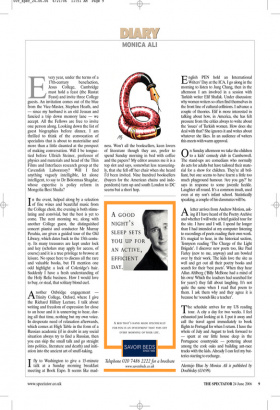E very year, under the terms of a 17th-century benefaction, Jesus
College, Cambridge must hold a feast (the Rustat Feast) and invite three College guests. An invitation comes out of the blue from the Vice-Master, Stephen Heath, and — since my husband is an old Jesuan and fancied a trip down memory lane — we accept. All the Fellows are free to invite one person along. Looking down the list of guest biographies before dinner, I am thrilled to think of the convocation of specialists that is about to materialise and more than a little daunted at the prospect of making conversation. Will I be tonguetied before Ullrich Steiner, professor of physics and materials and head of the Thin Films and Interfaces research group at the Cavendish Laboratory? Will I find anything vaguely intelligible, let alone intelligent, to say to Dr Bolormaa Shagdar, whose expertise is policy reform in Mongolia Best Shaila?
In the event, helped along by a selection of fine wines and beautiful music from the College choir, the evening is both stimulating and convivial, but the best is yet to come. The next morning we, along with another College guest, the distinguished concert pianist and conductor Mr Murray Perahia, are given a guided tour of the Old Library, which dates back to the 15th century. Its many treasures are kept under lock and key (scholars may apply for access, of course) and it is a true privilege to browse at leisure. No space here to discuss all the rare and valuable books, but I’ll mention one odd highlight: a lock of Coleridge’s hair. Suddenly I have a fresh understanding of the Holy Relic business. How I would love to buy, or steal, that solitary blond curl.
Another Oxbridge engagement — Trinity College, Oxford, where I give the Richard Hillary Lecture. I talk about writing and freedom of expression for close to an hour and it is unnerving to hear, during all that time, nothing but my own voice. In desperate need of relaxation afterwards, which comes at High Table in the form of a Russian academic (if in doubt in any social situation always try to find a Russian, then you can skip the small talk and go straight into politics, literature and death) and initiation into the ancient art of snuff-taking. ness. Won’t all the booksellers, keen lovers of literature though they are, prefer to spend Sunday morning in bed with coffee and the papers? My editor assures me it is a top slot and says, somewhat less reassuringly, that she fell off her chair when she heard I’d been invited. Nine hundred booksellers (buyers for the American chains and independents) turn up and south London to DC seems but a short hop. English PEN hold an International Writers’ Day at the ICA. I go along in the morning to listen to Jung Chang, then in the afternoon I am involved in a session with Turkish writer Elif Shafak. Under discussion: why women writers so often find themselves in the front line of cultural collisions. I advance a couple of theories. Elif is more interested in talking about how, in America, she has felt pressure from the critics always to write about the ‘issues’ of Turkish women. How does she deal with that? She ignores it and writes about whatever she likes. In an audience of writers this meets with warm approval.
On Sunday afternoon we take the children to a kids’ comedy club in Camberwell. The stand-ups are comedians who normally do acts for adults but have tailored their material for a show for children. They’re all brilliant, but one seems to have learnt a little too much playground humour. ‘Are you gay?’ he says in response to some juvenile heckle. Laughter all round. It’s a common insult, used even at my son’s infant school. Statistically speaking, a couple of his classmates will be.
Aletter arrives from Andrew Motion, asking if I have heard of the Poetry Archive and whether I will write a brief guided tour for the site. I have and I will. I spend far longer than I had intended at my computer listening to recordings of poets reading their own work. It’s magical to hear, in the historical section, Tennyson reading ‘The Charge of the Light Brigade’. I discover new poets too, like Paul Farley (new to me, anyway) and am bowled over by their work. The kids love the site as well and get out all their poetry books and search for their ‘best poets’. When they hear Allan Ahlberg (‘Billy McBone had a mind of his own/ Which the teachers had searched for for years’) they fall about laughing. It’s not quite the same when I read that poem to them. I ask them why and they agree it is because he ‘sounds like a teacher’.
The schedule arrives for my US reading tour. A city a day for two weeks. I feel exhausted just looking at it. I put it away and call the travel agent immediately to book flights to Portugal for when I return. I have the whole of July and August to look forward to — spent at our little house deep in the Portuguese countryside — pottering about among the cork oaks and building ant-race tracks with the kids. Already I can feel my batteries starting to recharge.



















































 Previous page
Previous page